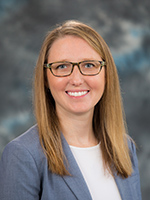Date/Time
Date(s) - 10/10/2023
9:00 am - 10:00 am
Location
HPNP 1404
Categories
Whitney L. Stoppel, Ph.D.
William P. and Tracy Cirioli Term Assistant Professor
Department of Chemical Engineering
University of Florida
Title: Exploring Silk Fibroin Materials: From Bioactive Molecule Entrapment to New Sources for Silk Fibroin
Abstract: Unique mechanical and structural properties arise from silk fibroin-based materials when regenerated silk proteins are rendered water-insoluble to form 3D structures. These materials are formed via a process that results in the collapse of the linearized silk fibroin biopolymer into beta sheet structures that form nanocrystalline domains. We leverage these mechanical and structural properties to create useful silk fibroin-based biomaterials, including nanoparticles and three-dimensional culture platforms. We are interested in using these materials to either deliver bioactive molecules to local cells or tissues upon implantation or injection, or as culture platforms for investigating mechanisms of disease. However, in the biomaterials community, it is often difficult to quantify the term “useful” or determine what starting conditions will lead to successful material formulations. Thus, recent work in the Stoppel Lab has taken three paths: a focus on the development of silk fibroin hemoglobin-based oxygen carriers, more fundamental work focused on improving predictive material design through an understanding of materials degradation, and an exploration into how the source of the silk fibroin biopolymer impacts utility. In this talk, I will give a short overview of our efforts to design, characterize, and optimize all-natural hemoglobin-based oxygen carriers for applications in oxygen delivery and supplementation as an artificial blood substitute. Then, I will share our efforts to use kinetic modeling to explain silk biomaterial degradation in vitro as a function of nanocrystalline domain content, polymer molecular weight, and addition of secondary components, such as extracellular matrix proteins. Lastly, I will highlight our efforts to utilize silk fibers from alternative insect sources for new advancements in silk fibroin biomaterial applications.
Bio: Whitney Stoppel holds the position of William P. and Tracy Cirioli Term Assistant Professor in the Department of Chemical Engineering at the University of Florida, where she also serves as an affiliate faculty member of the J. Crayton Pruitt Family Department of Biomedical Engineering. She earned her B.S. in Chemical and Biomolecular Engineering from Tulane University and completed her Ph.D. in Chemical Engineering, along with a graduate certificate in Cellular Engineering, at the University of Massachusetts Amherst. Prior to joining UF in 2018, Dr. Stoppel completed an NIH IRACDA postdoctoral fellowship in Biomedical Engineering at Tufts University. Dr. Stoppel’s current research focuses on the creation, development, characterization, and validation of all-natural biomaterial platforms for applications in healthcare and medicine. Specifically, the Stoppel Lab is dedicated to advancing biomaterial platforms capable of delivering bioactive molecules to sites of injury or disease, utilizing natural silk fibroin-based biopolymers. Furthermore, the lab explores the potential of alternative insect sources for silk fibroin proteins and their future applications, particularly in advanced manufacturing and scale-up of production. Dr. Stoppel’s significant contributions have been recognized through various research grants, including a Department of Defense Congressionally Directed Medical Research fund Discovery Award and an NIH NIGMS R35 Maximizing Investigators’ Research Award, among others. Within the University of Florida, Dr. Stoppel is actively involved in teaching undergraduate chemical engineers, offering courses such as Elementary Transport and Bioprocess Engineering & Bioseparations. She also chairs the Graduate Recruitment Committee, playing a pivotal role in fostering the growth of the Chemical Engineering PhD program. Additionally, Dr. Stoppel is deeply committed to the well-being and success of UF ChE graduate students. Her dedication to their advancement is evident through her initiation of a 1st Year PhD Peer Mentoring Program within the Chemical Engineering Department at UF. This program aims to cultivate a sense of community and provide valuable insights into the graduate experience, dispelling any hidden curriculum for new students. These efforts build upon previous endeavors undertaken during the pandemic, ensuring that PhD students maintain a strong sense of community and support throughout their academic journey despite ongoing challenges.

